Posted March 7, 2017 by Nicky in Reviews / 0 Comments
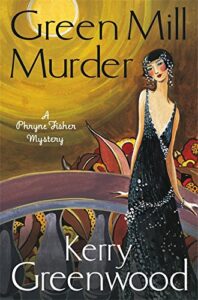 The Green Mill Murder, Kerry Greenwood
The Green Mill Murder, Kerry Greenwood
This book wins for the wombat ex machina alone.
Other than that, on a reread this felt a bit all over the place. There are two overlapping mysteries: one a murder, and one a disappearance. There’s two romances, one of which actually makes me feel kind of squicky inside now I think about it — it’s not often Phryne makes a judgement about who to sleep with that I really disagree with (heck, that’s the point of Phryne; she makes her own decisions)… but one of the two is certainly twisted in his morality, and Phryne does suspect that from the start. I don’t really get the appeal of him, either.
All the same, the book features Phryne being the delight she always is. She protects a queer friend-of-a-friend from the attentions of the vice squad, flies a plane solo to find someone, makes her own decisions and puts her foot down when she has to. The found family are more in the background in this one, given that the high point (ha) of the book is Phryne’s solo flight and her time with a man who has made himself almost a hermit — but of course, they do feature.
I’m left a bit befuddled by the way that the nastiness of people and their squiggly morality seems to be somewhat justified by the fact that it gives Nerine, a blues singer, some real blues to sing about. But I would like to hear her singing, from the descriptions…
Rating: 3/5
Tags: book reviews, books, crime, Kerry Greenwood, mystery
Posted March 6, 2017 by Nicky in Reviews / 2 Comments
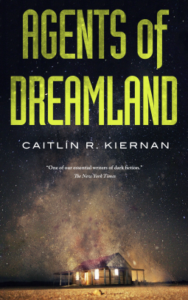 Agents of Dreamland, Caitlin R. Kiernan
Agents of Dreamland, Caitlin R. Kiernan
Received to review via Netgalley; publication date 28th February 2017
Once again, not knowing my Lovecraft tripped me up. Yep, this is yet another Lovecraft-based story, although in this case it’s a rather less well-known one: the Fungi from Yuggoth. Not one I’d have known anything about even if I’d known in advance, but perhaps I might have been better prepared for the sheer bleakness and darkness of this story had I known it was based on Lovecraft’s mythos in any way.
It’s an intriguing little novella; self-contained, though it hints at a world before and after it through one character who is, to some extent, ‘unstuck in time’. The flesh-crawling horror of the fungi, a kind of invasion we’re helpless to fight, is done really well. There’s one phrase which just made me shudder, because of all the different implications stacked together: “the fruiting corpse”. Gah. Gaaah.
It’s very effective writing, and because I don’t know to what extent it takes any of the detail from Lovecraft, I can say that it’s definitely something that can stand on its own. It doesn’t rely on me realising exactly what’s going on through familiarity with Lovecraft; the creeping unease works as well or better if you’re ignorant of where things are going.
Rating: 4/5
Tags: book reviews, books, SF/F
Posted March 5, 2017 by Nicky in Reviews / 0 Comments
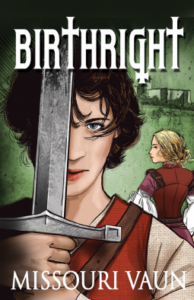 Birthright, Missouri Vaun
Birthright, Missouri Vaun
Received to review via Netgalley; publication date 14th February 2017
Birthright is a fun, fast-moving story of a sort typical in fantasy: the lost heir to a throne taken by a tyrant. And this version is a fun example of the genre, with strong female characters coming out of your ears — and falling in love with each other, too. The love story is at least as important to the plot as the lost heir, which is worth keeping in mind; it motivates the way the end of the story shakes out, and takes up a good amount of the narration. I enjoyed that though Aiden is boyish and Kathryn more feminine, there’s no stereotyping — both can fight, both can rule, both know what they’re doing.
There are a couple of moments where I felt things rushed by a little too fast — the connection between the two characters grows very quickly in just a couple of scenes — and where I’d have liked a bit more depth, like the characters of Frost and of Gareth, or even Rowan. Without more background, for example, Kathryn’s jealous moment made little sense, especially since how we got to that moment felt a little contrived.
Nonetheless, it’s fun and has a happy ever after, and I’d definitely recommend it to people looking for lesbian fantasy.
Rating: 3/5
Tags: book reviews, books, queer fic, romance, SF/F
Posted March 4, 2017 by Nicky in Reviews / 4 Comments
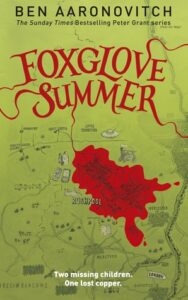 Foxglove Summer, Ben Aaronovitch
Foxglove Summer, Ben Aaronovitch
Once again, this book takes a step back from the main action. It’s not that the events of Broken Homes aren’t alluded to, because they are. In the background, there’s a lot of stuff going on with tracking down Lesley and the Faceless Man. But the main action of the plot is a police procedural dealing with some missing children. I wasn’t really surprised that this book brought in the concept of a changeling child, but it did manage to give the whole idea a couple of twists that did surprise me.
For me, both the strength and weakness of the book is the lack of progression in that main series plot, and the absence of many of the supporting characters. There’s no Lesley to make Peter do the proper policing thing, and there’s no Nightingale for backup. Which leaves Peter on his own, thinking for himself, and showing that actually, he doesn’t need those two. He also keeps showing that though he might not be as good a copper as Lesley, who never misses a beat, he’s a good policeman because he’s a good man. And this book reminds us of the people Nightingale and Peter are meant to be working for — ordinary people who need protection — rather than against (mysterious practioners of unclear motive).
I’m definitely ready for more of the main plot now, but the respite from it wasn’t bad either.
Rating: 4/5
Tags: Ben Aaronovitch, book reviews, books, crime, mystery, SF/F
Posted March 3, 2017 by Nicky in Reviews / 0 Comments
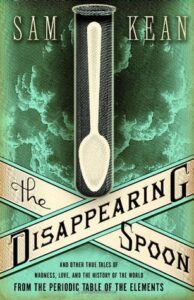 The Disappearing Spoon, Sam Kean
The Disappearing Spoon, Sam Kean
The Disappearing Spoon is not quite as entertaining to me as Sam Kean’s book on neuroscience, but it’s still reasonably fun and definitely an easy read. There’s all kinds of random facts, and he makes things like electron shells very clear — even for me, with my brain’s stubborn refusal to grasp it all. He writes with humour and enthusiasm, pulling out interesting characters and discoveries from the history of the Periodic Table and its elements.
I’m just not as into chemistry/physics as I am biology. Even organic chemistry. I should be, but, alas. So I found that this dragged a bit — for me. It’d probably be unfair to assume it’d drag for you as well, if you’re actually a fan of chemistry.
Rating: 3/5
Tags: book reviews, books, non-fiction, science
Posted March 2, 2017 by Nicky in Reviews / 2 Comments
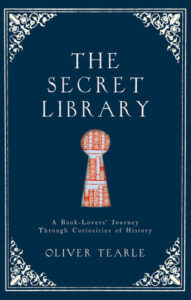 The Secret Library, Oliver Tearle
The Secret Library, Oliver Tearle
This is a beautifully presented book, at least in the hardback — the dustcover is lovely, with a keyhole cut into the front and edged with silver, and the book is nicely bound. It’s not quite as meta as the binding of Keith Houston’s The Book, but it’s still a lovely object that will make a good gift for book lovers of your acquaintance.
In terms of content, it’s fairly shallow: it’s a whistlestop tour, as it says several times, so the facts here are more on the level of trivia than anything in-depth. If you’d like a survey of literature and weird facts relating to literature and literary figures, it’s a good one. It made for a good book to read on the train, too, as you could easily dip in and out of it. There was no need to keep track of things too closely.
I think I hoped for more, but honestly, I’m not sure what I was expecting.
Rating: 3/5
Tags: book reviews, books, non-fiction
Posted March 1, 2017 by Nicky in Reviews / 0 Comments
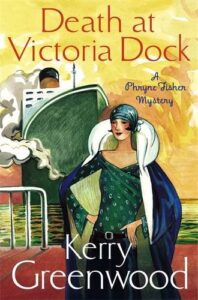 Death at Victoria Dock, Kerry Greenwood
Death at Victoria Dock, Kerry Greenwood
Another fun outing with Phryne, this one opening with a young man dying in Phryne’s arms. That gives us a driven, cold, angry Phryne. It’s always fun to see Phryne shocked right out of her comfort zone and realising that death can touch those around her, and this book gives us a Phryne who is almost (but not quite) out of her depth, with the kidnap of Dot and… well, everything else that happens.
I did find it a little too dramatic this time around, though. Anarchy! Guns! Seances! It’s all a bit sensational, and while I know that’s what I’m likely to get with a Phryne novel, still… this one definitely doesn’t have the cosy feel of some of the others, and there’s a real sense of peril in places which is at odds with the pretty clothes, sexual liberation and epic spreads at lunch and dinner.
Rating: 3/5
Tags: book reviews, books, crime, Kerry Greenwood, mystery
Posted February 28, 2017 by Nicky in Reviews / 2 Comments
 What If? Serious Scientific Answers to Absurd Hypothetical Questions, Randall Munroe
What If? Serious Scientific Answers to Absurd Hypothetical Questions, Randall Munroe
What If? is a fun outing in which the author of xkcd answers weird science questions while ignoring the implausibility of those situations ever arising. So we get things like “what if all the rain from a cloud fell in one big droplet” and “what if Earth started expanding” — and Munroe answers them, rummaging through scientific papers and obscure experimental results to find out his closest guess at what would happen. I can’t really speak for his science in most places (only the DNA question was really down my street), but given how pedantic the internet can be, I’m sure Munroe did his absolute best to find an answer that would be, if not incontestable, at least not easily dismissed.
The whole thing is illustrated with Munroe’s usual stick figures, and I still remain completely baffled as to how the combination of his stick figures and his lettering can imbue things with feeling. It makes no sense. And yet the Moon promising to help the Earth start spinning again? Gah. Moon, I love you!
He also has a humorous tone and a clear way of explaining, so despite the weird situations that he examines, it pretty much all makes sense… though I took his equations for granted, and any other calculations.
Rating: 4/5
Tags: book reviews, books, non-fiction
Posted February 27, 2017 by Nicky in Reviews / 6 Comments
 The World Without Us, Alan Weisman
The World Without Us, Alan Weisman
This book tries to imagine what the world would be like if we were just raptured away or abducted by aliens, with little or no warning. Despite being ostensibly a book about the world without us, it turns out to mostly be a book about us. Or, more accurately, what we’ve done to the world, which the world will have to cope with whether we’re here and part of that or not. If you’re science-aware, there’s probably not much to learn — in fact, if you’re up on your climate science, what’s here is very basic when it comes to that. It does muse interestingly on certain specific animals and habitats which would benefit from a world without humans. There’s some good stuff on places where humans don’t go, which are proving to be wildlife sanctuaries even when they’re utterly radioactive.
But mostly, I think I hoped for a bit more of the future, and a bit less of the past and present. Of course, the past can tell us what some environments used to be like without human intervention, or after specific types of human intervention. And of course, the present shapes what will come. And we can’t really predict evolution — look at the differences between the stuff in the Burgess shale and later forms, for example. Or even the way that mammals succeeded the dinosaurs. But I still hoped for a bit more about the future, what kinds of animals might thrive, what it might look like.
If you’re already depressed by what humans have been up to, this will make you feel worse. A lot worse. None of it was news to me, but still… Yeesh, we’ve messed up.
Rating: 3/5
Tags: book reviews, books, non-fiction
Posted February 26, 2017 by Nicky in Reviews / 0 Comments
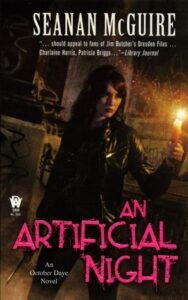 An Artificial Night, Seanan McGuire
An Artificial Night, Seanan McGuire
I enjoy these books a heck of a lot, but I do agree with a lot of the criticism I’m seeing about Toby. She refuses to be helped, she makes everything harder than it needs to be, and she’s not remotely honest with herself about her own motivations for… anything, but mostly her heroism. I’m sort of waiting to see it get someone that she’s allegedly trying to protect killed, just because she won’t think in shades of grey. There are no teeth in her constant desire to protect Quentin, for example — he comes through just fine physically, despite her every statement that he’s going to get killed. It’s remarkably bloodless in that sense, in this book in particular — there was a bit more of a price in A Local Habitation.
That said, I enjoy the lore of this book a lot. Blind Michael is creepy as heck, the use of nursery rhymes and the Tam Lin ballad is a delight, and the Luideag gets a pretty big part to play. We see more of faerie and the rules that bind them, and we get to explore another world.
I enjoy the series a lot, but I’m not sure about the people I know who sneer about, say, Ilona Andrews in comparison. I see a lot of the same tropes in action, and Kate Daniels is more self-aware than October Day. They’re both fun urban fantasy, using different lore in fascinating ways… but nope, Seanan McGuire’s Toby isn’t somehow more literary. If you like this series, you’ll probably also like the Kate Daniels series.
Rating: 4/5
Tags: book reviews, books, fantasy, Seanan McGuire
 The Green Mill Murder, Kerry Greenwood
The Green Mill Murder, Kerry Greenwood








